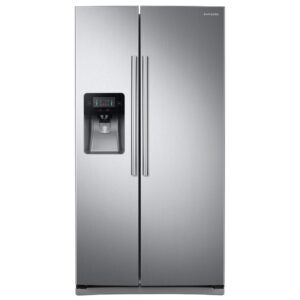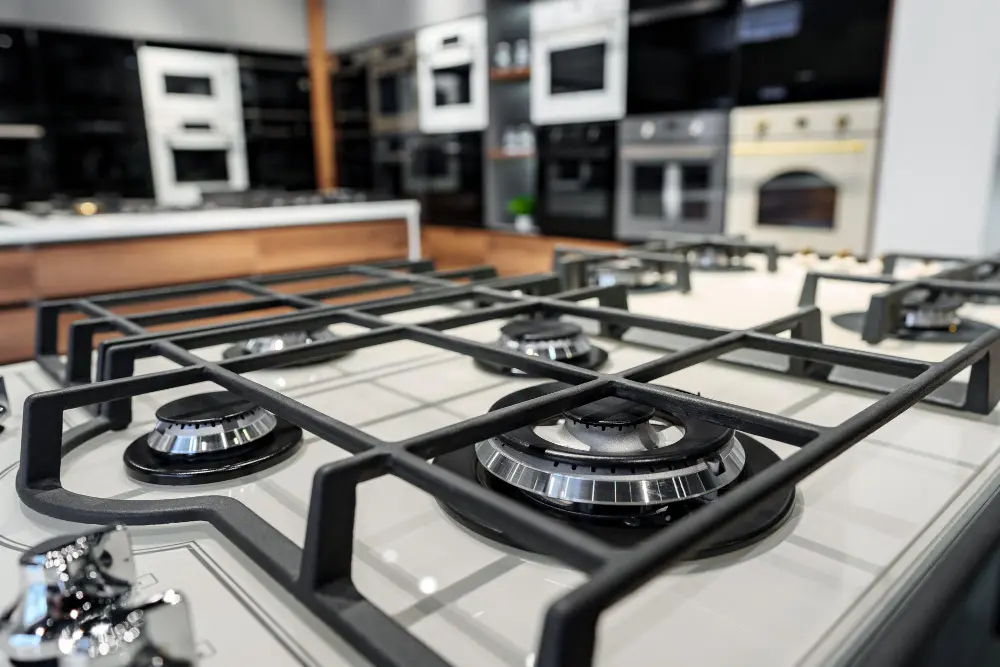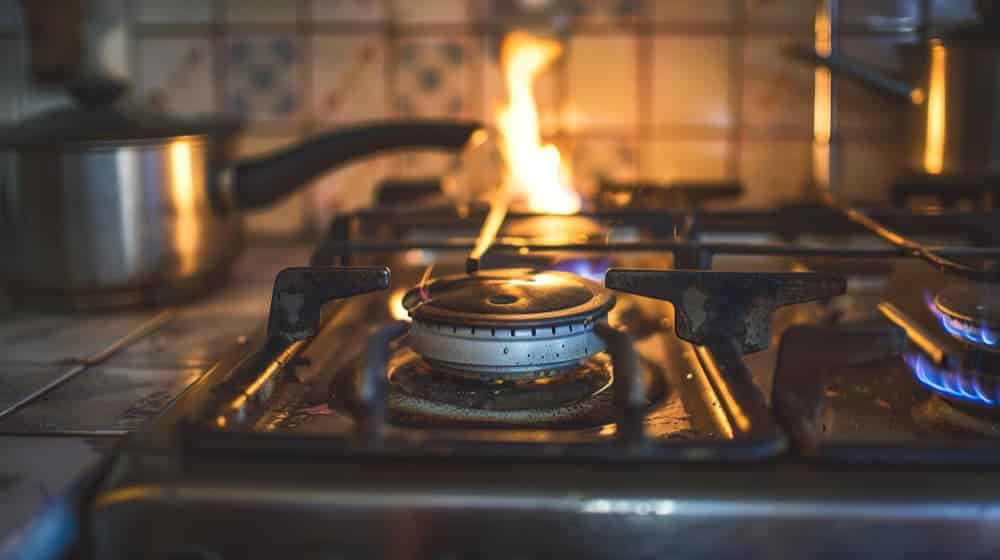When it comes to outfitting your kitchen, the decision between a gas or electric stove is one that many homeowners grapple with. Both options have their unique advantages and drawbacks, making it challenging to determine which one offers the best value in the long run. In this comprehensive guide, we’ll delve into the intricacies of gas and electric stoves, exploring their energy efficiency, cost-effectiveness, and overall performance to help you make an informed choice that aligns with your cooking needs and budget, including considerations like gas vs electric stove monthly cost.
Understanding the Fundamentals: Gas vs. Electric Stoves
At the core of the gas vs. electric stove debate lies the fundamental difference in how these appliances generate heat. Gas stoves utilize the combustion of natural gas or propane to produce instant, adjustable heat, while electric stoves rely on electrical resistance to heat up their coils or smooth-top surfaces.
Gas Stoves: Precision and Instant Heat
Gas stoves are renowned for their ability to provide precise temperature control and rapid heat response. The open flame of a gas burner allows for quick adjustments, making it easier to achieve the perfect sear, simmer, or boil. This immediate heat transfer is particularly beneficial for tasks like stir-frying, sautéing, or flambéing, where precise temperature management is crucial for precise cooking.
Electric Stoves: Consistent and Efficient Heating
Electric stoves, on the other hand, offer a more even and consistent heat distribution across the cooking surface. This can be particularly advantageous for baking, roasting, and other applications where maintaining a stable temperature is essential. Additionally, modern electric stoves, especially those with induction cooktop technology, have become increasingly energy-efficient, rivaling the performance of their gas counterparts.
Evaluating the Cost Factors: Upfront and Operational Expenses
When it comes to the financial implications of gas and electric stoves, there are several factors to consider, including upfront costs and long-term operational expenses.
Upfront Costs: Balancing Initial Investment
The initial purchase price of gas and electric stoves can vary, but the differences are often relatively minor. According to industry data, gas stoves typically range from $800 to $2,300, while electric models fall within the $650 to $2,800 price range. However, the installation costs for gas stoves can be significantly higher, as they require dedicated gas lines, which may not be readily available in all homes.
Operational Costs: Fuel Efficiency and Energy Consumption
The ongoing operational costs of gas and electric stoves are where the more significant differences lie. In general, gas stoves are considered more energy-efficient, as they convert a higher percentage of their fuel into usable heat compared to electric models. This translates to lower energy bills, particularly in areas where natural gas is the more affordable option, leading to potential energy savings on utility bills.
That said, the cost-effectiveness of gas stoves can be influenced by fluctuations in natural gas prices, as well as the efficiency of the specific model. Conversely, electric stoves have become increasingly efficient, with induction technology leading the charge in energy-saving performance, making it a consideration when determining which is more efficient.
Factors to Consider: Safety, Maintenance, and Cooking Preferences
Beyond the financial aspects, the choice between a gas or electric stove can also be influenced by safety considerations, maintenance requirements, and personal cooking preferences. These stove considerations are crucial in making an informed decision.
Safety Concerns: Mitigating Risks
Both gas and electric stoves come with their own set of safety concerns. Gas stoves pose a risk of gas leaks and potential carbon monoxide exposure, necessitating proper installation and regular maintenance. Electric stoves, while generally considered safer in this regard, can still present fire hazards if left unattended or if spills are not promptly cleaned, raising questions about whether electric stoves are safer and the associated fire risk with open flames and accidents.
Maintenance and Cleaning: Ease of Use
Cleaning and maintenance requirements can also play a role in the decision-making process. Gas stoves typically have removable grates and burners, making them relatively easy to clean, while electric stoves with smooth-top surfaces often require more diligent scrubbing to remove stubborn stains and spills.
Cooking Preferences: Versatility and Control
The type of cooking you prefer can also sway your decision. Gas stoves are often favored by professional chefs and aspiring chefs due to their precise temperature control and ability to perform specialized techniques like charring, toasting, and flambéing. Electric stoves, on the other hand, can excel in tasks like baking and roasting, where consistent heat distribution is crucial.
The Rise of Induction Technology: A Game-Changer?
In recent years, the emergence of induction technology has introduced a new player in the gas vs. electric stove debate. Induction stoves utilize electromagnetic fields to directly heat the cookware, offering the rapid heat response of gas stoves with the energy efficiency and safety of electric models.
Induction stoves are renowned for their exceptional energy efficiency, with up to 90% of the energy being transferred directly to the pan, compared to around 40% for gas stoves and 70% for traditional electric stoves. This efficiency translates to lower energy bills and a more eco-friendly cooking experience.
Moreover, induction stoves are often praised for their precise temperature control, quick boil times, and easy-to-clean smooth-top surfaces. As the technology continues to evolve and become more affordable, induction stoves may present a compelling alternative that combines the best features of both gas and electric options.
Evaluating Your Specific Needs and Circumstances
When it comes to choosing between a gas or electric stove, there is no one-size-fits-all solution. The stove choice ultimately depends on your specific needs, preferences, and the unique circumstances of your home.
Assessing Your Cooking Habits and Preferences
Consider the types of dishes you commonly prepare, the cooking techniques you favor, and the level of temperature control you require. If you’re a seasoned home chef who values precise heat management, a gas stove may be the better fit. Alternatively, if you prioritize consistent heat distribution and energy efficiency, an electric or induction stove may be the more suitable option.
Evaluating Your Home’s Infrastructure
The existing infrastructure of your home can also play a significant role in the stove decision-making process. If your home already has a gas line installed, the cost of converting to an electric stove may be prohibitive. Conversely, if your home lacks a gas line, the expense of installing one could make an electric stove the more practical choice.
Considering Long-Term Ownership Costs
When evaluating the overall cost-effectiveness, factor in not only the upfront purchase price but also the projected long-term operational expenses, including fuel costs and maintenance requirements. This holistic approach will help you determine the stove type that aligns best with your budget and financial priorities, especially if you are cost-conscious.
Exploring Leasing Options: A Flexible Alternative
For those who are unsure about their long-term cooking needs or prefer to avoid the upfront investment, leasing a stove may be a viable option to consider. Appliance leasing companies, such as A&A Appliance Leasing, offer gas and electric stoves for rent, allowing customers to enjoy the benefits of a high-quality stove without the burden of ownership. Whether you are looking for a rental stove, gas stove rental, or rent-to-own gas stoves, these options can provide flexibility and convenience.
Leasing can be particularly advantageous for tenants who are renting their homes, frequently relocating, or simply want the flexibility to upgrade or change their stove as their needs evolve. With streamlined signup processes and prompt delivery, leasing can provide a hassle-free solution for accessing the stove of your choice in a rental property.
Making an Informed Decision
Navigating the gas vs. electric stove debate requires a comprehensive understanding of the various factors at play, from energy efficiency and cost-effectiveness to safety and personal cooking preferences. By weighing the pros and cons of each option, considering your specific needs and circumstances, and exploring innovative stove alternatives like induction technology and leasing, you can make an informed decision that will provide you with a cooking experience tailored to your unique preferences and budget.
Remember, the choice between a gas or electric stove is not a one-size-fits-all decision. Take the time to carefully evaluate your stove options, consult with industry experts, and make a selection that will serve you well in the kitchen for years to come, ensuring tenant satisfaction and aligning with tenant preferences.












